Catena is now Pearl Talent! Same mission, new name.
The emergence of legal virtual assistants in the legal industry represents a transformative shift in how legal practices operate. These experts provide specialized remote services and support, allowing lawyers to focus on core legal tasks and client needs. Virtual legal assistants use specialized technology and legal expertise to increase productivity, reduce overhead costs, and improve client service.
At Pearl Talent, we understand the unique requirements of law firms and lawyers, which is why we offer dedicated virtual legal assistants. Our team is committed to enhancing efficiency and productivity by offering tailored support that precisely aligns with the dynamic needs of lawyers. This commitment ensures seamless client service and operational excellence, enabling attorneys to entirely focus on providing exceptional legal advice.
Driven by our dedication to helping law firms meet their offshore hiring needs, we’ve developed this guide to define the role of a legal virtual assistant with a detailed job description. This resource aims to assist lawyers and aspiring virtual paralegal assistants in improving their productivity and efficiency. By the end of this guide, you will clearly understand what it takes to successfully hire a legal virtual assistant in your department.
Let’s dive in!
Understanding the Role of a Legal Virtual Assistant
Legal virtual assistants are critical to enhancing productivity and profitability within law firms. These professionals handle important administrative tasks, such as client communications, appointment scheduling, and legal research. They effectively streamline operations, allowing lawyers to concentrate on billable services and core legal responsibilities.
The responsibilities of a virtual assistant for attorneys extend to managing client calls, coordinating meetings, and overseeing contract management. Their role optimizes firm efficiency and fosters a client-centric experience through prompt and reliable service delivery. Hiring law firm virtual assistants offers a cost-effective solution compared to traditional employees, presenting flexibility and scalability within law practices.
The Beginner's Guide to Becoming a Legal Virtual Assistant
Becoming the best virtual legal assistant requires you to have the basic skills necessary to assist legal professionals remotely. Here’s a beginner’s guide to becoming a legal virtual assistant designed to help you navigate and excel in this dynamic role:
Prepare Necessary Equipment and Software Tools
To excel in your career as a virtual legal assistant, ensuring you have the essential equipment and software tools is essential. These tools will streamline your workflow and empower you to effectively support law firms remotely. Here’s a look at the fundamental tools every aspiring legal virtual assistant should have:
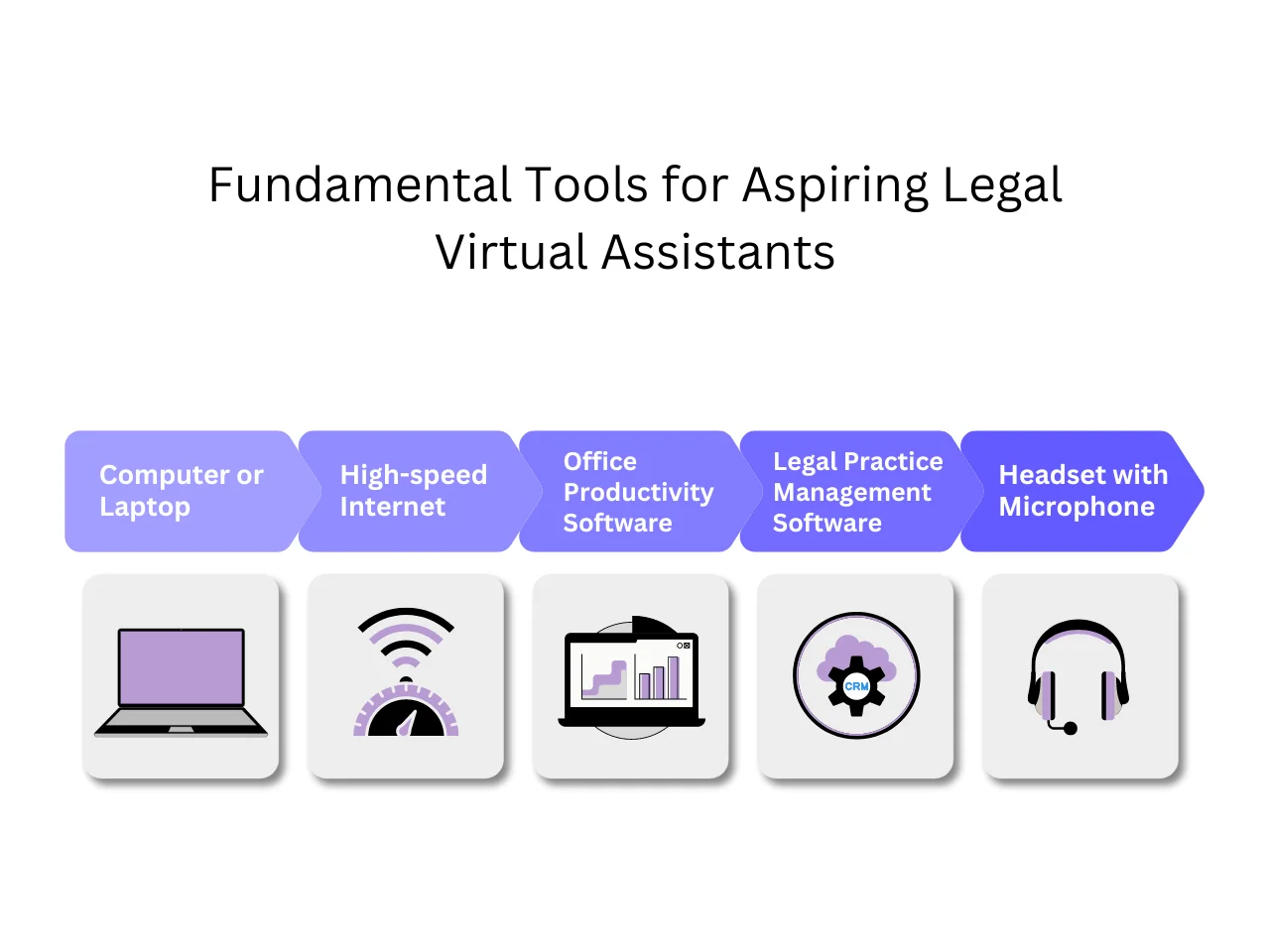
- Computer or Laptop: Reliable devices are essential for legal research, document management, and client communication.
- High-Speed Internet: This is essential for seamless video conferencing, legal database access, and collaborative legal teams.
- Office Productivity Software: Use tools like Microsoft Office or Google Workspace to create legal documents, manage schedules, and organize tasks more efficiently.
- Legal Practice Management Software: Platforms like Clio or MyCase help manage case files, track billable hours, and securely manage client records.
- Headset with Microphone: Essential for clear communication during client calls, virtual meetings, and chats. These tools allow you to get things done more efficiently and with clear communication.
Establish Your Workspace for Optimal Productivity
Establishing an optimal workspace as a legal virtual assistant maximizes productivity and efficiency. Start by setting aside a dedicated area in your home or office that is free of distractions and conducive to focused work. Make sure your workspace is well-equipped with the necessary tools, such as a comfortable chair, a spacious desk, and adequate lighting.
Afterward, organize your materials and resources to promote efficiency and easy access to documents and software tools. Consider ergonomic setups to minimize physical strain during long hours of work. Finally, personalize your workspace with items that inspire and motivate you, creating an environment that enhances concentration and productivity.
Acquire the Right Legal Knowledge and Skills
Acquiring the necessary legal knowledge and skills forms the foundation of your journey. This knowledge empowers you to effectively assist attorneys and increase your value in a dynamic and demanding work environment. Here is a comprehensive guide to acquiring such a skill set that a prospective legal virtual assistant should focus on to succeed:
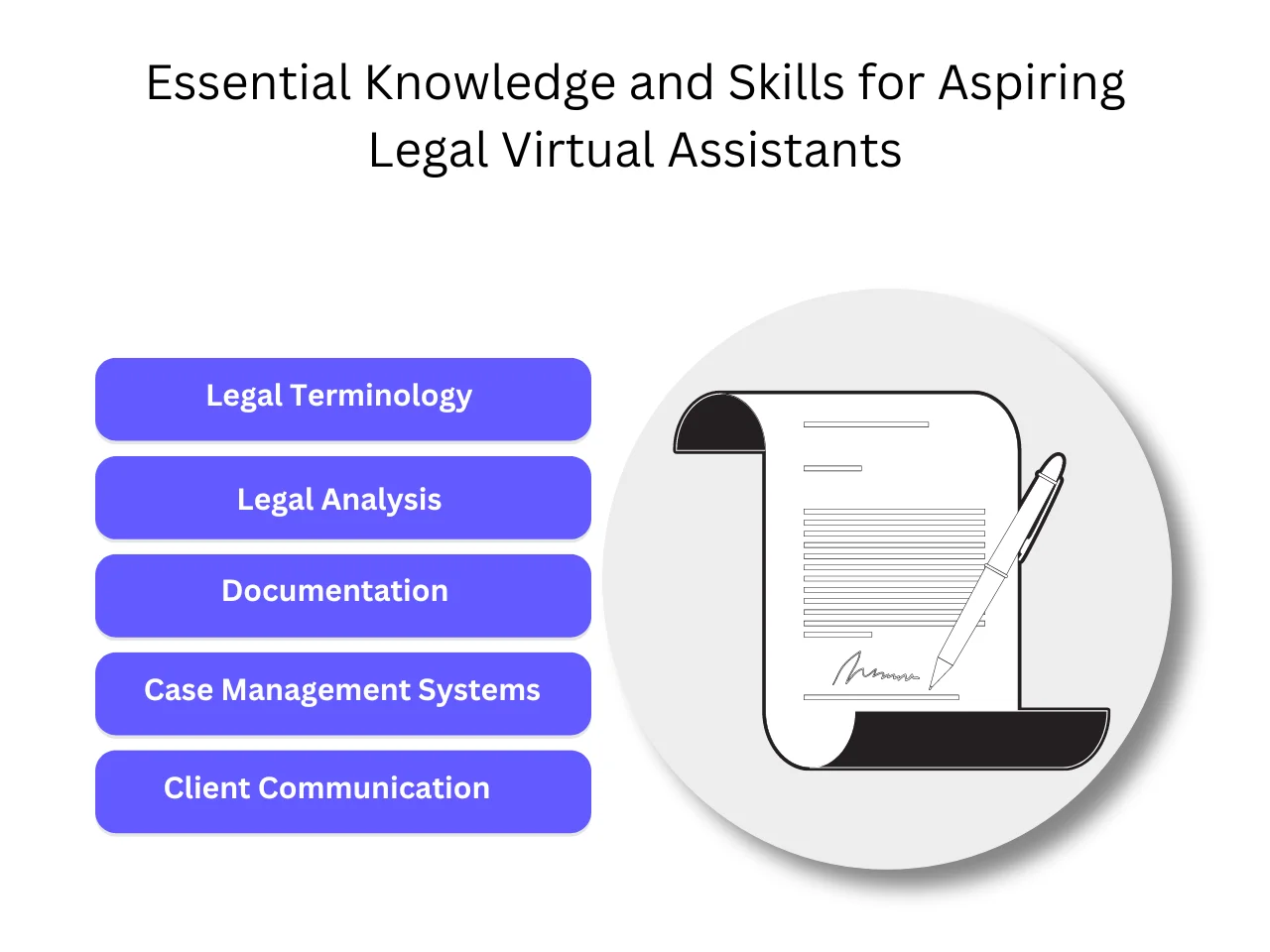
- Legal Terminology: Understand basic legal terms and concepts to navigate legal documents and communicate effectively.
- Legal Analysis: Adapt your legal research skills and use online databases such as LexisNexis or Westlaw to gather accurate information and support legal cases.
- Documentation: Skills in drafting legal documents such as contracts, letters, and briefs ensure clarity and adherence to legal standards.
- Case Management Systems: Organize and maintain information files with confidentiality. Follow general procedure guidelines to effectively support legal teams.
- Client Communication: It is vital to enhance your communication skills, both verbally and in writing, to build confidence and clarity in communicating with team members and legal experts.
Step-by-Step Guide to Starting as a Legal Virtual Assistant
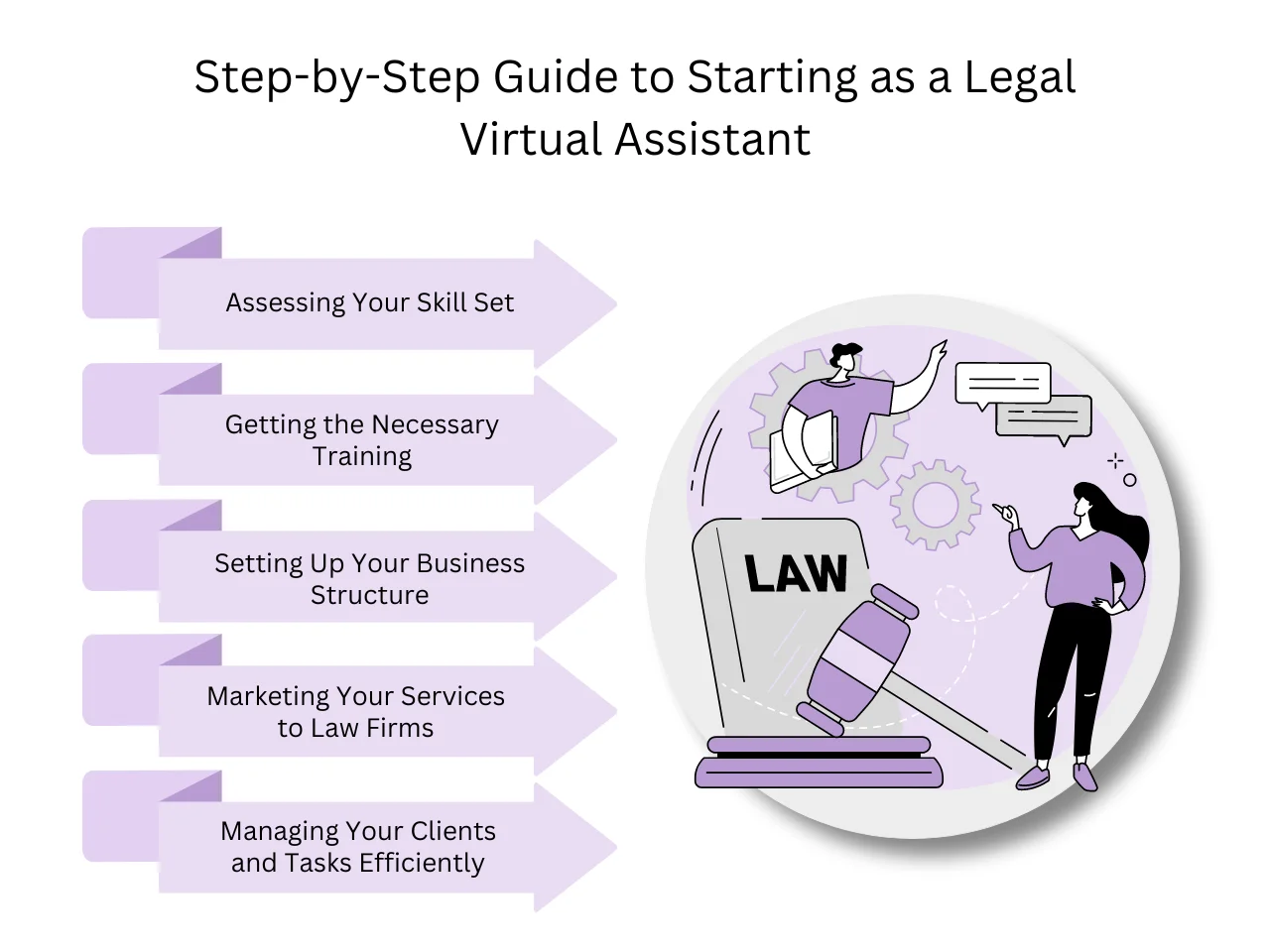
To start your journey as a legal virtual assistant, you'll need to focus on acquiring the necessary skills and understanding the unique demands of legal support roles. Below are the essential steps and strategies to help you establish yourself effectively in the field.
Step 1: Assess Your Skill Set
Before diving into your career as a virtual legal assistant, it's crucial to assess your qualifications. Identify areas for improvement, such as proficiency in calendar management, administrative support, time management, and handling complex tasks.
Additionally, ensure familiarity with legal terminology. You can research techniques and legal practice management tools. This self-assessment will guide your learning curve and help you plan your remote assistance service to meet the needs of law firm business owners.
Step 2: Get the Necessary Training
Once you figure out your core skills, acquire the essential training to enhance your legal and administrative knowledge. Proper training ensures that you have the skills and knowledge to handle the complexities of legal tasks efficiently and ethically. It not only enhances your professional credibility but also equips you to provide high-quality support that meets the rigorous standards of the legal industry.
To get the necessary training, consider the following:

- Enroll in Accredited Online Courses: Platforms like Coursera or LinkedIn Learning offer courses on the basics of law and the workplace techniques necessary for legal virtual assistants
- Pursue Industry Certifications: Certifications from organizations such as the International Virtual Assistant Association (IVAA) attest to your expertise and build your credibility with potential clients.
- Attend Legal Webinars and Workshops: Participate in webinars by legal professionals to gain insights into industry trends.
- Join Professional Network: Join online communities and forums dedicated to professional legal assistants to exchange knowledge and seek guidance from experienced professionals.
- Explore Consulting Opportunities: Connect with mentors in the legal profession to gain valuable advice and guidance as you navigate your career as a legal digital assistant.
Step 3: Set Up Your Business Structure
Establish a solid legal virtual assistant services foundation by choosing a suitable business structure, such as a sole proprietorship or LLC. Register your business, obtain necessary licenses or permits, and set up a professional website and email address. Develop clear policies and procedures for client contracts, invoicing, and data security to instill trust and professionalism.
Step 4: Market Your Services to Law Firms
Develop a marketing plan to present your services to potential law firm clients. Improving your skills in legal research, document management, and client communications is essential to attracting companies that need virtualization support. Establish an online professional presence with a beautifully designed website and active social media content to build credibility and reachability.
Here are some options where you can market your services to law firms:

- Legal Directories and Platforms: Listing your services on legal-specific directories such as Avvo or LegalMatch can increase your visibility to law firms searching for virtual support.
- LinkedIn Networking: Utilize LinkedIn to connect with legal professionals, join relevant groups, and share insightful content to highlight your skills and expertise as a legal virtual assistant.
- Industry Webinars and Workshops: Participate in webinars hosted by legal organizations or present at workshops to showcase your expertise and attract law firms seeking specialized virtual assistance.
- Cold Outreach and Email Campaigns: Craft targeted outreach emails highlighting your skills and offering solutions to common legal administrative challenges tailored to specific law firms' needs.
- Collaborate with Legal Service Providers: Partner with legal service providers for referrals and collaborative opportunities that can expand your client base.
Step 5: Manage Your Clients and Tasks Efficiently
Implement efficient client management systems to streamline communication and project workflows. Utilize cloud-based project management tools like Trello or Asana to track tasks, deadlines, and client deliverables.
Additionally, establish clear communication channels and expectations with clients regarding project updates, timelines, and feedback. Regularly evaluate and adjust your processes to ensure optimal efficiency and client satisfaction as you grow your remote legal assistant journey.
Benefits of Hiring a Legal Virtual Assistant for Law Firms
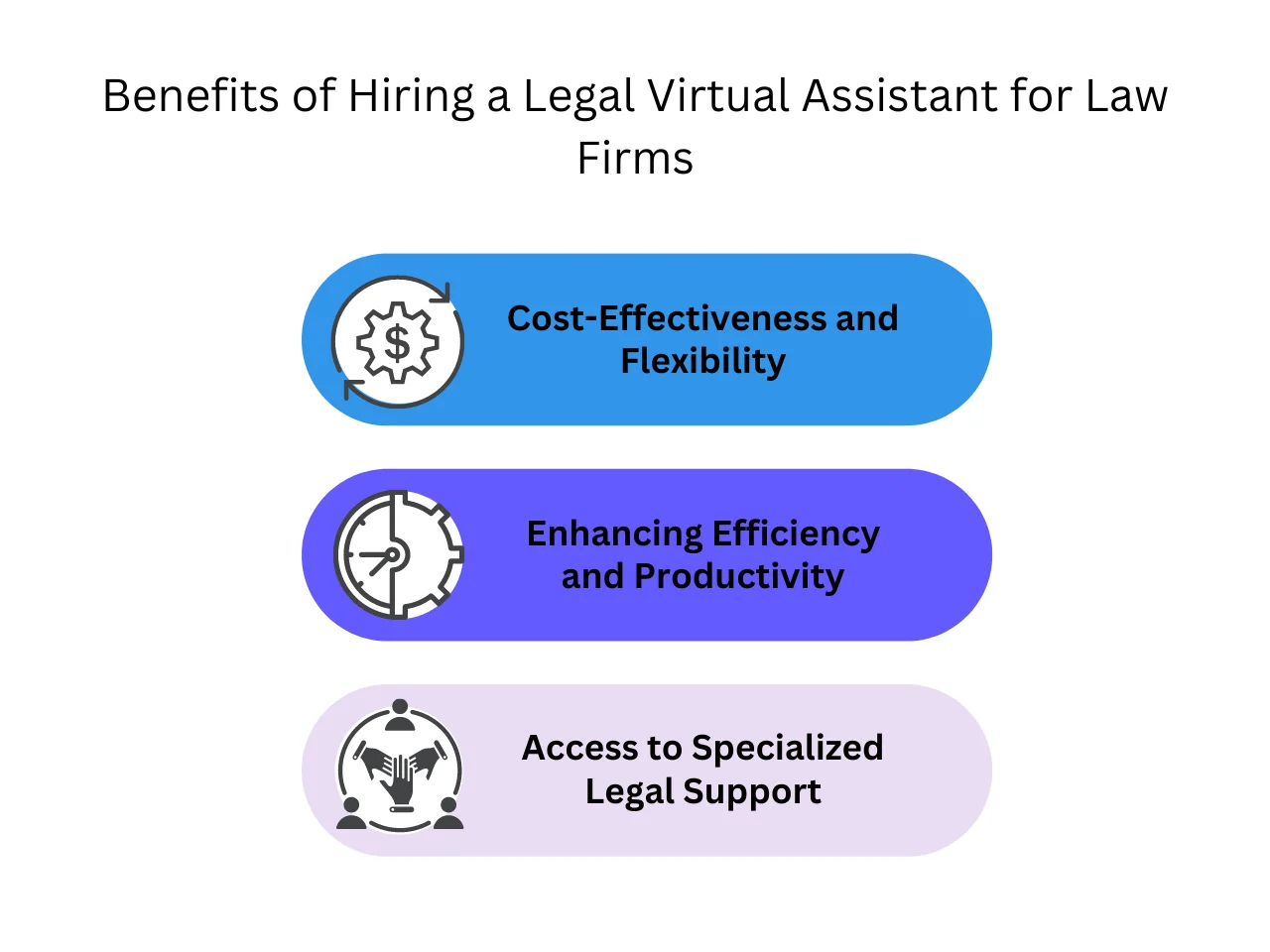
Hiring a legal virtual assistant for law firms offers a few advantages, from cost-efficiency to increased productivity. Here, we outline the detailed top 3 key reasons why integrating virtual assistance can significantly benefit your law practice.
Cost-Effectiveness and Flexibility
Working with a virtual legal assistant offers law firms a cost-effective alternative to full-time staff. Virtual assistants typically work on a contract or part-time basis, reducing overhead costs associated with employee benefits, office space, and equipment. This flexibility allows law firms to scale their support as needed, whether during busy periods or for specific projects, without long-term employment commitment.
Greater Efficiency and Productivity
Legal virtual assistants streamline administrative tasks, such as client communication, scheduling, and document management. Lawyers can focus more on core legal work and revenue-generating activities by delegating these non-billable tasks. Virtual assistants leverage technology to improve workflow efficiency, ensuring tasks are completed promptly and accurately and enhancing firm productivity.
Access to Specialized Legal Support
Virtual assistants with legal backgrounds or training offer specialized support in legal research, document preparation, and case management. They bring expertise in using legal software and databases, enabling law firms to access critical resources and insights without investing in extensive training or hiring additional staff. This specialized support enhances the quality of legal services provided to clients and supports firm growth in specific practice areas.
How Law Firms Can Find and Hire the Right Legal Virtual Assistant
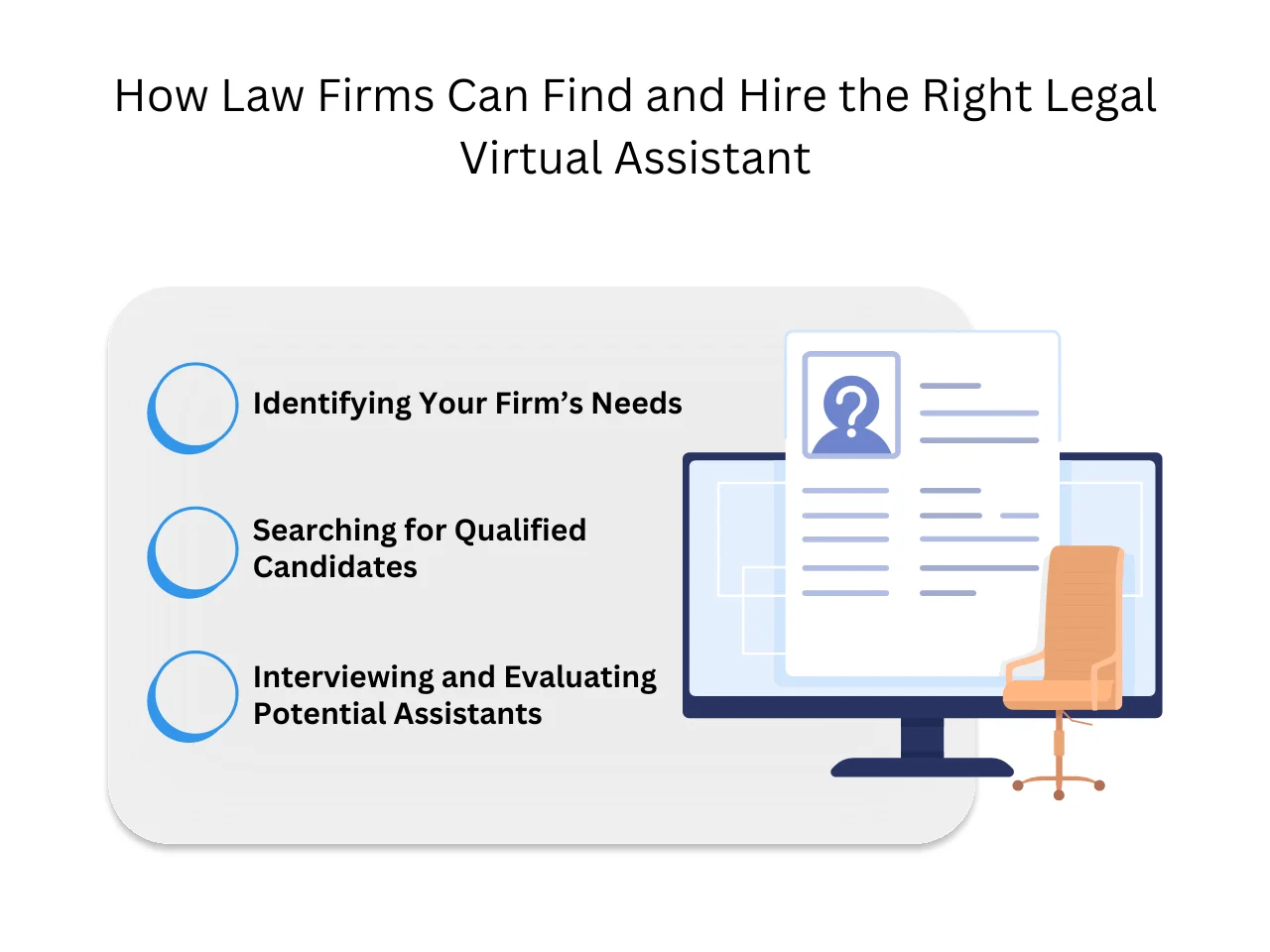
Finding and hiring freelance virtual assistants is crucial for law firms looking to optimize their operations. Here are practical steps and considerations to help you successfully identify and onboard the ideal virtual legal assistant for your specific needs:
Identify Your Firm’s Needs
Before starting the hiring process for a legal virtual assistant, analyze your firm’s specific needs and what tasks you want to outsource to virtual assistants. Determine if you need assistance with administrative tasks, legal research, client communications, or specialized legal assistance. Clarifying these requirements will help you develop detailed job descriptions and identify candidates who match your company’s needs.
Search for Qualified Candidates
Start your search for a legal virtual assistant by searching virtual assistant platforms, professional networking sites, and legal professional offices. Look for candidates with relevant legal experience, expertise in legal software, and strong programming skills. Review candidates’ resumes, portfolios, and client testimonials to determine their skills and fit for your company.
Conduct an Interview and Evaluate Potential Legal Assistants
Interview candidates thoroughly and assess their communication, problem-solving, and understanding of legal processes. Ask specific questions about their past experience with business roles your company needs. To build a successful working relationship, evaluate their professionalism, trustworthiness, and fit with your company culture.
Best Practices for Working with a Legal Virtual Assistant
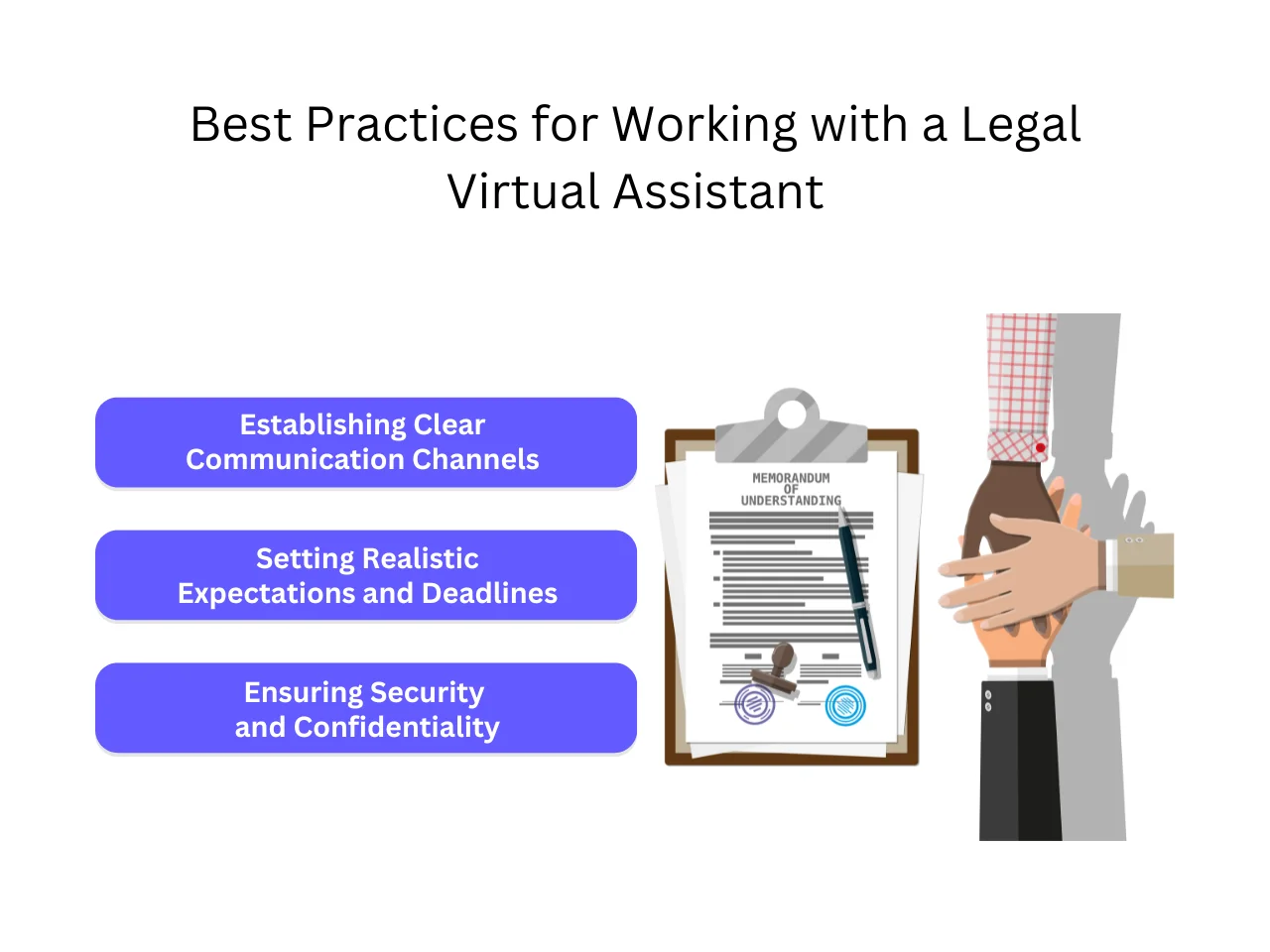
Effective collaboration with a legal virtual assistant is crucial for maximizing productivity within law firms. Follow these best practices to establish a successful working relationship and make the most of your assistant's expertise:
Establish Clear Communication
Effective communication is essential to a successful collaboration with a formal legal assistant. Establish clear guidelines on preferred communication channels, response times, and project updates. Use email, instant messaging, and project management systems to communicate consistently and transparently. This clarity ensures that both parties are aligned regarding tasks, deadlines, and project progress.
Set Realistic Expectations and Deadlines
Clearly define services, deliverables, and expected results from the beginning of your partnership. Work with your freelance virtual assistant to set realistic deadlines based on project priorities and workload. Encourage open discussions to discuss challenges or schedule adjustments as needed. Setting achievable goals increases productivity and makes tasks more efficient and satisfying.
Ensure Security and Confidentiality
Protect sensitive customer information and legal documents by implementing strong security measures. Your legal virtual assistant must sign a confidentiality agreement outlining their responsibility to protect client privacy and data. Use encrypted file-sharing platforms and secure communication channels to safeguard client information and reduce the risk of a data breach. Regularly review and update your security measures to meet regulatory standards and protect sensitive information within your legal operations.
Key Takeaway
A legal virtual assistant plays a pivotal role in enhancing the operational efficiency of legal firms. Legal professionals can focus more on delivering high-quality legal services by delegating routine tasks and administrative duties. Embracing this role can lead to improved client satisfaction and streamlined workflow processes.
Furthermore, integrating a law firm virtual assistant can provide a competitive edge and ensure sustainable growth as the legal industry evolves. Understanding the importance of this position is crucial for leveraging its full potential in optimizing day-to-day operations.
Want to learn more about different virtual assistant roles and how they can benefit your business? Discover more insights on Pearl Talent's blog. We provide industry knowledge and practical tips to help you find the perfect match for your business needs. Explore our resources to make informed hiring decisions and boost your productivity today!
Frequently Asked Questions
Originally Published
July 25, 2024




.svg)












